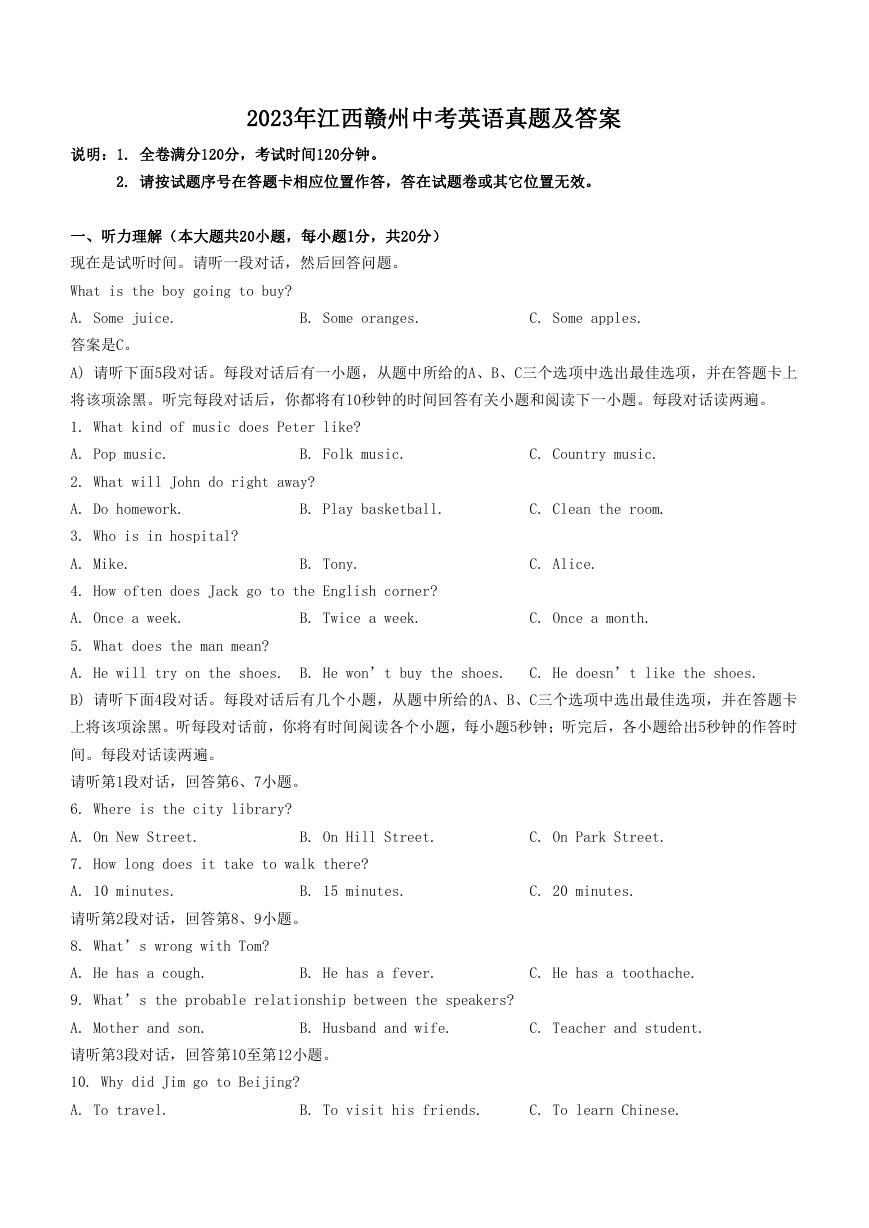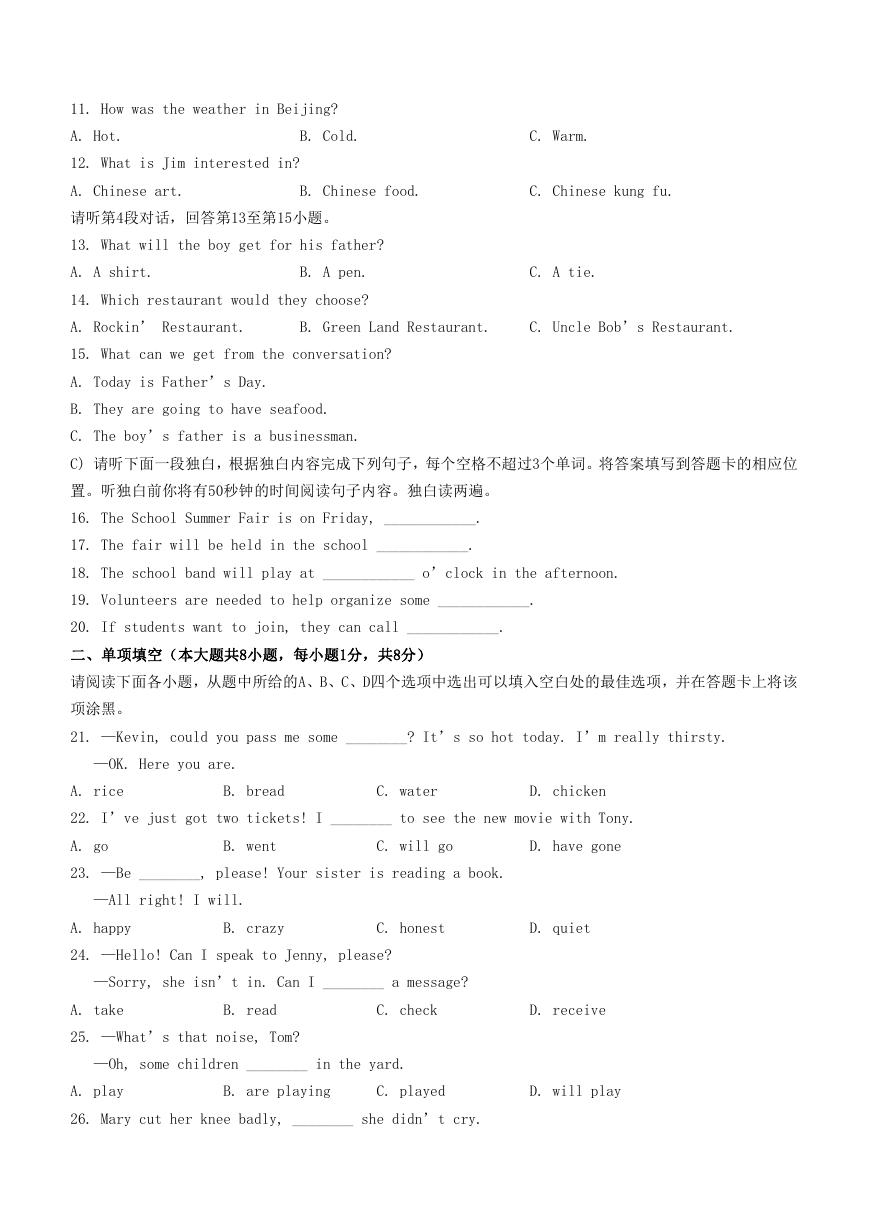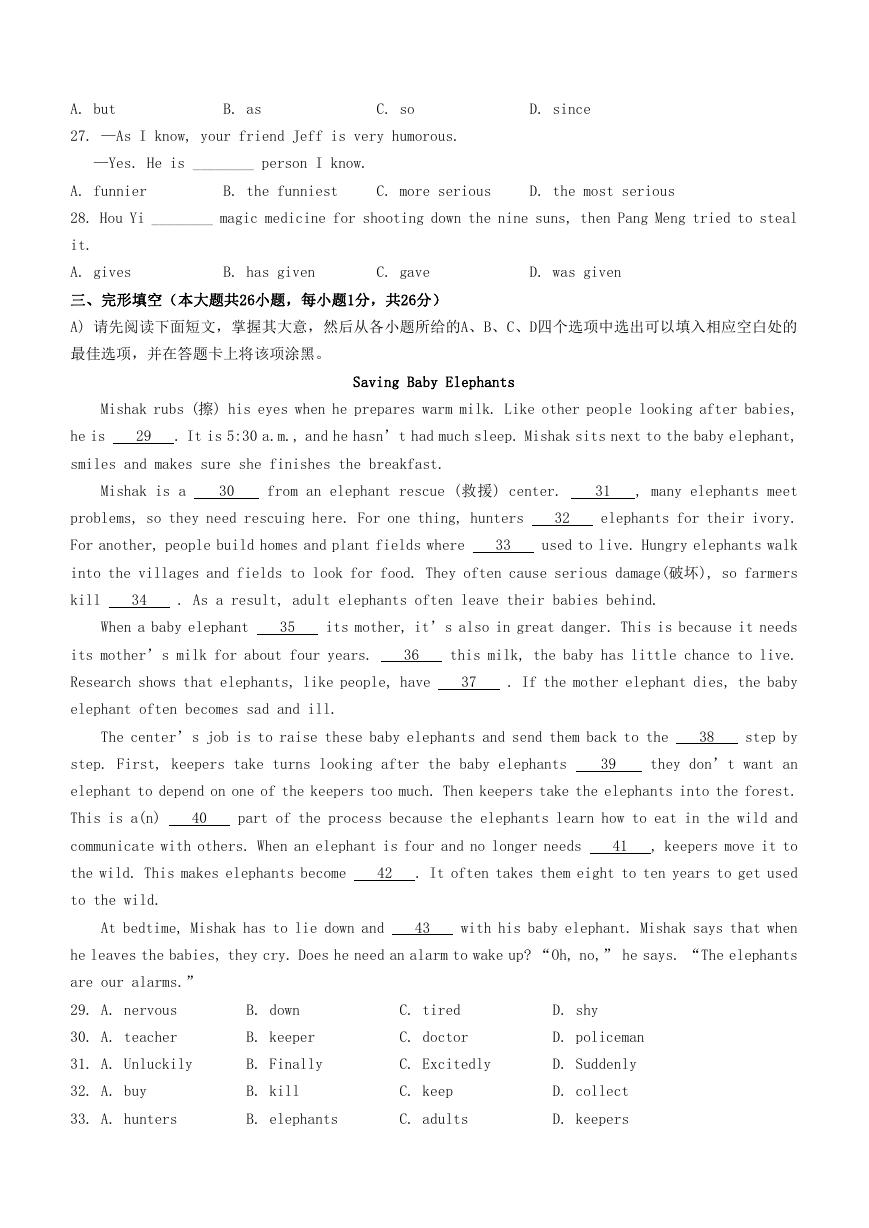2023年江西赣州中考英语真题及答案
说明:1. 全卷满分120分,考试时间120分钟。
2. 请按试题序号在答题卡相应位置作答,答在试题卷或其它位置无效。
一、听力理解(本大题共20小题,每小题1分,共20分)
现在是试听时间。请听一段对话,然后回答问题。
What is the boy going to buy?
A. Some juice.
B. Some oranges.
C. Some apples.
答案是C。
A) 请听下面5段对话。每段对话后有一小题,从题中所给的A、B、C三个选项中选出最佳选项,并在答题卡上
将该项涂黑。听完每段对话后,你都将有10秒钟的时间回答有关小题和阅读下一小题。每段对话读两遍。
1. What kind of music does Peter like?
A. Pop music.
B. Folk music.
C. Country music.
2. What will John do right away?
A. Do homework.
B. Play basketball.
C. Clean the room.
3. Who is in hospital?
A. Mike.
B. Tony.
C. Alice.
4. How often does Jack go to the English corner?
A. Once a week.
B. Twice a week.
C. Once a month.
5. What does the man mean?
A. He will try on the shoes.
B. He won’t buy the shoes.
C. He doesn’t like the shoes.
B) 请听下面4段对话。每段对话后有几个小题,从题中所给的A、B、C三个选项中选出最佳选项,并在答题卡
上将该项涂黑。听每段对话前,你将有时间阅读各个小题,每小题5秒钟;听完后,各小题给出5秒钟的作答时
间。每段对话读两遍。
请听第1段对话,回答第6、7小题。
6. Where is the city library?
A. On New Street.
B. On Hill Street.
C. On Park Street.
7. How long does it take to walk there?
A. 10 minutes.
B. 15 minutes.
C. 20 minutes.
请听第2段对话,回答第8、9小题。
8. What’s wrong with Tom?
A. He has a cough.
B. He has a fever.
C. He has a toothache.
9. What’s the probable relationship between the speakers?
A. Mother and son.
B. Husband and wife.
C. Teacher and student.
请听第3段对话,回答第10至第12小题。
10. Why did Jim go to Beijing?
A. To travel.
B. To visit his friends.
C. To learn Chinese.
�
11. How was the weather in Beijing?
A. Hot.
B. Cold.
C. Warm.
12. What is Jim interested in?
A. Chinese art.
B. Chinese food.
C. Chinese kung fu.
请听第4段对话,回答第13至第15小题。
13. What will the boy get for his father?
A. A shirt.
B. A pen.
C. A tie.
14. Which restaurant would they choose?
A. Rockin’ Restaurant.
B. Green Land Restaurant.
C. Uncle Bob’s Restaurant.
15. What can we get from the conversation?
A. Today is Father’s Day.
B. They are going to have seafood.
C. The boy’s father is a businessman.
C) 请听下面一段独白,根据独白内容完成下列句子,每个空格不超过3个单词。将答案填写到答题卡的相应位
置。听独白前你将有50秒钟的时间阅读句子内容。独白读两遍。
16. The School Summer Fair is on Friday, ____________.
17. The fair will be held in the school ____________.
18. The school band will play at ____________ o’clock in the afternoon.
19. Volunteers are needed to help organize some ____________.
20. If students want to join, they can call ____________.
二、单项填空(本大题共8小题,每小题1分,共8分)
请阅读下面各小题,从题中所给的A、B、C、D四个选项中选出可以填入空白处的最佳选项,并在答题卡上将该
项涂黑。
21. —Kevin, could you pass me some ________? It’s so hot today. I’m really thirsty.
—OK. Here you are.
A. rice
B. bread
C. water
D. chicken
22. I’ve just got two tickets! I ________ to see the new movie with Tony.
A. go
B. went
C. will go
D. have gone
23. —Be ________, please! Your sister is reading a book.
—All right! I will.
A. happy
B. crazy
C. honest
D. quiet
24. —Hello! Can I speak to Jenny, please?
—Sorry, she isn’t in. Can I ________ a message?
A. take
B. read
C. check
D. receive
25. —What’s that noise, Tom?
—Oh, some children ________ in the yard.
A. play
B. are playing
C. played
D. will play
26. Mary cut her knee badly, ________ she didn’t cry.
�
A. but
B. as
C. so
D. since
27. —As I know, your friend Jeff is very humorous.
—Yes. He is ________ person I know.
A. funnier
B. the funniest
C. more serious
D. the most serious
28. Hou Yi ________ magic medicine for shooting down the nine suns, then Pang Meng tried to steal
it.
A. gives
B. has given
C. gave
D. was given
三、完形填空(本大题共26小题,每小题1分,共26分)
A) 请先阅读下面短文,掌握其大意,然后从各小题所给的A、B、C、D四个选项中选出可以填入相应空白处的
最佳选项,并在答题卡上将该项涂黑。
Saving Baby Elephants
Mishak rubs (擦) his eyes when he prepares warm milk. Like other people looking after babies,
he is
29
. It is 5:30 a.m., and he hasn’t had much sleep. Mishak sits next to the baby elephant,
smiles and makes sure she finishes the breakfast.
Mishak is a
30
from an elephant rescue (救援) center.
31
, many elephants meet
problems, so they need rescuing here. For one thing, hunters
32
elephants for their ivory.
For another, people build homes and plant fields where
33
used to live. Hungry elephants walk
into the villages and fields to look for food. They often cause serious damage(破坏), so farmers
kill
34
. As a result, adult elephants often leave their babies behind.
When a baby elephant
35
its mother, it’s also in great danger. This is because it needs
its mother’s milk for about four years.
36
this milk, the baby has little chance to live.
Research shows that elephants, like people, have
37
. If the mother elephant dies, the baby
elephant often becomes sad and ill.
The center’s job is to raise these baby elephants and send them back to the
38
step by
step. First, keepers take turns looking after the baby elephants
39
they don’t want an
elephant to depend on one of the keepers too much. Then keepers take the elephants into the forest.
This is a(n)
40
part of the process because the elephants learn how to eat in the wild and
communicate with others. When an elephant is four and no longer needs
41
, keepers move it to
the wild. This makes elephants become
42
. It often takes them eight to ten years to get used
to the wild.
At bedtime, Mishak has to lie down and
43
with his baby elephant. Mishak says that when
he leaves the babies, they cry. Does he need an alarm to wake up? “Oh, no,” he says. “The elephants
are our alarms.”
29. A. nervous
B. down
30. A. teacher
B. keeper
C. tired
C. doctor
D. shy
D. policeman
31. A. Unluckily
B. Finally
C. Excitedly
D. Suddenly
32. A. buy
B. kill
C. keep
33. A. hunters
B. elephants
C. adults
D. collect
D. keepers
�
34. A. us
35. A. loses
36. A. By
37. A. foods
38. A. center
39. A. unless
40. A. easy
41. A. milk
42. A. brave
43. A. work
B. it
B. helps
B. For
B. homes
B. zoo
B. but
B. fast
B. fruits
B. popular
B. play
C. her
C. saves
C. As
D. them
D. follows
D. Without
C. friends
D. feelings
C. wild
C. or
C. important
C. grass
C. friendly
C. study
D. city
D. because
D. strange
D. leaves
D. patient
D. sleep
B) 请先阅读下面短文,掌握其大意,然后用方框中所给词的适当形式填空,并将答案填写到答题卡的相应位
置。每个词限用一次。
enter
steal
what
while
another
laugh
visitor
impolitely
height
wise
environment
Many years ago, there were many states in China. The State of Qi used to be very strong, but
it became less powerful. Yan Zi was a
44
adviser, so the king of Qi sent him to ask Chu to
support each other.
The king of Chu knew Yan Zi was very short. He tried to make Yan Zi feel shy about his
45
.
When Yan Zi arrived, the guard told him
46
through the small gate. Yan Zi didn’t get angry.
“Only a state of dogs will greet
47
with a gate for dogs. I’m visiting the State of Chu.
This gate isn’t for me.” Yan Zi said. So the guard had to take him through the main gate.
The king of Chu was unhappy at
48
Yan Zi did. “Why did Qi send YOU? Don’t they have anyone
better?” the king tried
49
way.
“If Qi meets a great king, it’ll send the best ambassador (使臣). I’m the worst. That’s why
I’m here.” Yan Zi replied calmly (镇定地). At this time, the guards brought a thief (小偷) to the
king. The thief was from Qi. “Ha! Yan Zi, is Qi a state of thieves?” asked the king
50
Yan Zi replied, “The orange trees south of Huai River produce big and delicious fruit,
.
51
the orange trees north of Huai River produce small and sour fruit. The
52
makes the fruit grow
differently. In Qi, people are good and honest, but here, they
53
. What made that person a
thief here?” Finally, the king looked at Yan Zi and
54
, “I was wrong about you and your
state!”
�
四、阅读理解(本大题共23小题,每小题2分,共46分)
A) 请阅读下面短文,根据短文内容从每小题所给的A、B、C、D四个选项中选出最佳选项,并在答题卡上将该
项涂黑。
A
Come and try something new! Soapbox racing cars have no motors (发动机). You need a hill or a
slope (斜坡) to race down.
Time:
From 10:00 a.m. to 4:00 p.m.
Place:
At the top of Clifton Avenue
Age:
Between 6 and 16
Enter fee: £22
Notice:
We will have experts to tell you all you need to know. See you at the top of the slope!
55. How much does a beginner pay for the race?
A. £22.
B. £16.
C. £7.
D. £6.
56. Who can take part in the race?
A. A 5-year-old boy.
B. A 17-year-old student.
C. A 10-year-old girl.
D. A 23-year-old teacher.
57. Which of the following about Soapbox Derby Race is TRUE?
A. The racing cars have motors.
B. The experts will come to help.
C. The race will be held at 9:00 a.m.
D. Racers will meet on Green Avenue.
B
A Bright Idea
Evans Wadongo was from a village of Africa. He had to do homework by the light of a kerosene
lamp (煤油灯). Evans’ eyes hurt and this made studying difficult. It was common in his village.
Many children left school for this reason...so they remained poor for the rest of their lives.
�
Although studying was difficult, Evans was an excellent student and went to a university. He
continued to worry about the kerosene lamp. By this time, he realized it was not just bad for
schoolchildren but for the whole family. First, it can cause illnesses such as coughs. Also, the
light can hurt people’s eyes. Besides, it can lead to fires. Lastly, kerosene is expensive, so
families have less money for food. It was difficult to come up with a different kind of lamp that
was cheap and good for the environment. Yet Evans did not give up.
One day, he had an idea. He could use a small solar (太阳能的) light. Sunlight is free and solar
power is good for the environment. Evans built his first solar lamp, and it worked. He began to build
more lamps and sent them to local families. An organization heard about this and provided money for
him to build more solar lamps.
Each lamp only cost $20. However, this was a lot of money to many villagers, who only earned
around $34 a week, so Evans made sure he kept the cost down. First, Evans used recycled materials.
Next, volunteers built the lamps. Finally, people from many countries gave away money to his team,
so the lamps were usually free.
Thousands of people had safe light. Julia, a mother of three, said, “Thanks to Evans, my children
have light to read, and I have my own light to cook.” The solar lamps made a big difference.
58. What does the underlined word “this” in Paragraph 1 refer to?
A. Leaving school.
B. Doing homework.
C. Having eye problems.
D. Having a bright idea.
59. How many problems about kerosene lamps are mentioned according to Paragraph 2?
A. 6.
B. 5.
C. 4.
D. 3.
60. Put the following information into correct order according to the passage.
a. Evans went to a university. b. Thousands of people had safe light.
c. His first solar lamp was invented. d. Kerosene lamps hurt Evans’ eyes.
e. Recycled materials were used in the lamps.
f. People from many countries gave away money.
A. d-a-c-e-f-b
B. d-f-b-a-e-c
C. a-d-f-e-c-b
D. a-e-c-d-f-b
61. Why does the writer give Julia’s example in Paragraph 5?
A. To share Julia’s experience.
B. To show Evans’ influence.
C. To describe Evans’ feelings.
D. To introduce Evans’ invention.
62. What is Evans like according to the passage?
A. Polite, talented and humorous.
B. Quiet, smart and honest.
�
C. Humorous, clever and friendly.
D. Hard-working, loving and creative.
C
When we think of art, we probably think of painting a picture on a strong cloth or special paper,
even on walls of a city. However, in many cultures people paint their faces instead.
①_________
In fact, face painting may be the very first form of art. Painting faces are in different colors
and patterns. This has been part of people’s traditions for thousands of years. The way that people
painted their faces can tell stories and lessons from the past.
②_________
People still paint their faces for lots of reasons. Patterns on faces connect people to a tribal
(部落) family and can show who is the most important person in the family. For fighters, it is a
way to make their enemies afraid. Face painting is also used in many ceremonies and special
celebrations.
How is face paint important in theater?
Face paint was important in Japanese and Chinese ancient ceremonies. It was also used in
traditional theatre to change the actors’ roles. Actors in those countries still wear white, black
and red face paint today to show feelings and make the bad people look dramatic (戏剧性的) and awful.
③_________
Tribal people make face paint from the natural colors in plants and earth. Plant parts are used
to make different colorings. The ingredients are dried over a fire and then made into a powder (粉
末). This is then mixed with animal fat.
63. Match the title with each part.
a. Is face paint art?
b. Is wall painting a symbol?
c. Why paint your face?
d. How wear face paint?
e. Where does the paint come from?
A. ①-a, ②-b, ③-c
C. ①-a, ②-c, ③-e
B. ①-b, ②-e, ③-d
D. ①-b, ②-d, ③-c
64. How long has face painting been part of people’s traditions?
A. For a few years.
B. For several centuries.
C. For about 100 years.
D. For thousands of years.
65. Why did fighters paint their faces when they fought?
A. To look friendly.
B. To look scary.
C. To look funny.
D.
To
look
�
painful.
66. What can we know about face paint?
A. Painting on the walls is the first form of art.
B. Animal fat is used to make different colorings.
C. Patterns on faces can show people’s ages in a family.
D. Face paint in colors can show actors’ feelings in China.
67. Which of the following can be the best title?
A. Face Art.
C. Wall Paintings.
B. Traditional Painters.
D. Tribal Celebrations.
D
Why do We Yawn?
Do you yawn? There are about 20 reasons that scientists think are possible for yawning after
research. They do not know exactly why yawning happens, but they do know many facts about yawning.
We know that everyone yawns in the same way. First you open your mouth slowly. Your mouth stays
open for about five seconds. You take in a lot of air and then push it out. Then you quickly close
your mouth. We also know that yawning is contagious. When you see someone yawn, you yawn, too.
Many people say they yawn because they are bored or tired. That might be true. People do often
yawn before they sleep and after they wake up. However, we know that people also yawn when they are
excited or nervous. Olympic runners, for example, often yawn before a race. Why is that? In 2007,
scientists found that a yawn can help a warm brain cool down.
Some scientists believe that yawning makes you notice things more quickly. When you yawn, you
breathe deeply. You also stretch (强化) the muscles (肌肉) in your face, mouth, and neck. Your eardrums
stretch, too. Maybe this helps you to be quicker to notice things.
In some countries, people think yawning is not nice. People put their hands over their mouths
to cover a yawn. In other countries, people think yawning is healthy. They think that opening the
mouth very big can let good things in. When they breathe out, they think that bad things go out of
the body with the air.
Scientists do not spend much time studying yawning. That is probably because yawning does not
hurt. It is just something we do.
68. What does the underlined word “contagious” in Paragraph 2 mean?
A. Able to spread quickly.
B. Able to breathe easily.
C. Able to change easily.
D. Able to sleep quickly.
�
















 2023年江西萍乡中考道德与法治真题及答案.doc
2023年江西萍乡中考道德与法治真题及答案.doc 2012年重庆南川中考生物真题及答案.doc
2012年重庆南川中考生物真题及答案.doc 2013年江西师范大学地理学综合及文艺理论基础考研真题.doc
2013年江西师范大学地理学综合及文艺理论基础考研真题.doc 2020年四川甘孜小升初语文真题及答案I卷.doc
2020年四川甘孜小升初语文真题及答案I卷.doc 2020年注册岩土工程师专业基础考试真题及答案.doc
2020年注册岩土工程师专业基础考试真题及答案.doc 2023-2024学年福建省厦门市九年级上学期数学月考试题及答案.doc
2023-2024学年福建省厦门市九年级上学期数学月考试题及答案.doc 2021-2022学年辽宁省沈阳市大东区九年级上学期语文期末试题及答案.doc
2021-2022学年辽宁省沈阳市大东区九年级上学期语文期末试题及答案.doc 2022-2023学年北京东城区初三第一学期物理期末试卷及答案.doc
2022-2023学年北京东城区初三第一学期物理期末试卷及答案.doc 2018上半年江西教师资格初中地理学科知识与教学能力真题及答案.doc
2018上半年江西教师资格初中地理学科知识与教学能力真题及答案.doc 2012年河北国家公务员申论考试真题及答案-省级.doc
2012年河北国家公务员申论考试真题及答案-省级.doc 2020-2021学年江苏省扬州市江都区邵樊片九年级上学期数学第一次质量检测试题及答案.doc
2020-2021学年江苏省扬州市江都区邵樊片九年级上学期数学第一次质量检测试题及答案.doc 2022下半年黑龙江教师资格证中学综合素质真题及答案.doc
2022下半年黑龙江教师资格证中学综合素质真题及答案.doc